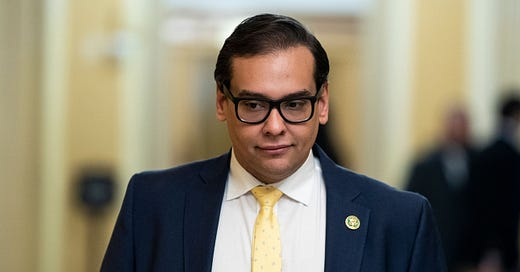Last week federal prosecutors in Brooklyn returned a superseding indictment against New York Republican Congressman George Santos. Santos first gained notoriety shortly after the 2022 Congressional elections, when the New York Times reported that he appeared to have lied repeatedly about his academic background, work history, and religious and ethnic heritage.
Santos falsely claimed to have worked for both Goldman Sachs and Citigroup. He claimed to have founded a nonprofit animal rescue organization, but there’s no record it exists. He said he graduated from Baruch College summa cum laude and received a master’s degree from New York University, but later admitted he had no college degrees at all.
Santos has claimed to have Jewish heritage and to be the grandson of Holocaust refugees, but at other times has said he is Catholic. In one response (my personal favorite) he told the New York Post : “I never claimed to be Jewish. I am Catholic. Because I learned my maternal family had a Jewish background, I said I was ‘Jew-ish.’”
These lies – or what Santos called “embellishing his resume” – were embarrassing and led to calls for his resignation, which Santos ignored. But as I wrote in this post last January, those personal lies, although sleazy, likely were not criminal.
But there were also questions swirling around Santos’s campaign and personal finances that appeared potentially more serious. Those questions ultimately led to Santos being indicted on thirteen felony counts last May. Then last week came the superseding indictment that added ten more felony charges.
So let’s take a deep dive into the Santos superseding indictment. Here’s how the allegations and charges break down.
George Santos (Credit: Will Oliver/EPA-EFE/Shutterstock)
The Alleged Schemes
The indictment charges Santos with engaging in four different fraud schemes.
The Party Program Scheme: During his 2022 campaign for Congress, Santos allegedly conspired with his campaign treasurer Nancy Marks to falsely inflate his fundraising numbers. The purpose of the scheme was to allow Santos to qualify for a program through which a national Republican Party committee would provide him with financial and logistical campaign support. To qualify for that program, he was required to show that his campaign had raised at least $250,000 from third-party contributors in a single quarter.
To meet that number, Santos and Marks falsely reported to the Federal Election Commission that more than ten members of their own families had made significant contributions to the campaign. Santos allegedly texted Marks a list of those family members, along with purported contribution amounts from each, for her to enter in the Year-End 2021 FEC report. For most of them, the donation amount reported was $5,800.
In reality, Santos and Marks knew that those family members had not made the reported donations and had not authorized the use of their personal information in the reports.
Through this scheme Santos claimed to hit the fundraising benchmark, falsely reporting 4th quarter 2021 donations of just over $251,000.00. As a result, he qualified for the national party committee program and received financial and logistical support from the committee.
In the first quarter of 2022, Santos and Marks allegedly falsely reported to the FEC that Santos had loaned his campaign $500,000. In fact, he never made such a loan and did not have the necessary money even if he had wanted to. This additional false report allowed the Santos campaign to continue to qualify for assistance from the national party committee through the 2022 election, when Santos won his seat.
Credit Card Fraud Scheme: The indictment charges that between December 2021 and August 2022 Santos carried out a scheme to steal personal and financial information from donors to his campaign. He then used that information to make tens of thousands of dollars in unauthorized charges to the credit cards. Through these charges, money was transferred to the Santos campaign, to the campaigns of other candidates for office, and to Santos’s personal bank account. To conceal the source of the funds and evade campaign contribution limits, he falsely reported that some of these amounts were donated by other persons rather than the true cardholders.
Fraudulent Campaign Organization Scheme: In another campaign fundraising scheme, Santos allegedly worked with an unidentified political consultant to defraud supporters of his 2022 campaign. Santos created an LLC and used it to solicit donations by falsely claiming it was a Super PAC that could raise unlimited funds. He said the money raised would be used solely for his re-election campaign. Once the donations came in, he allegedly transferred the money to personal bank accounts and then used it for personal expenses such as designer clothing and to pay his credit card bills.
Unemployment Insurance Fraud Scheme: In a separate scheme, Santos allegedly fraudulently obtained unemployment benefits during the Covid crisis. He repeatedly certified that he was unemployed, when in fact he was working at a Florida-based investment firm and earning $120,000 per year. As a result of this scheme, Santos allegedly received more than $24,000 in unemployment benefits to which he was not entitled.
Criminal Charges
Based on these different schemes, Santos is facing a total of 23 felony charges:
One count of conspiracy (18 U.S.C. § 371)
Nine counts of wire fraud (18 U.S.C. § 1343)
Four counts of false statements (18 U.S.C. § 1001)
Two counts of making a false document to obstruct (18 U.S.C. § 1519)
Two counts of aggravated identity theft (18 U.S.C. § 1028)
One count of credit card fraud (18 U.S.C. § 1029)
One count of theft of public funds (18 U.S.C. § 641), and
Three counts of money laundering (18 U.S.C. § 1957)
Aggravated identity theft carries a mandatory minimum consecutive sentence of two years in prison. For false statements and conspiracy the maximum penalty is 5 years in prison. For money laundering and theft the maximum penalty is 10 years. For credit card fraud it’s 15 years, and for wire fraud and obstruction it’s 20 years.
When you add it all up that’s — well, a whole lotta jail time. Even with the operation of the federal sentencing guidelines, Santos is facing years in prison.
The government is also seeking forfeiture of any property, assets, or other proceeds of the schemes that Santos may have.
Other Players
There are no co-defendants named in the indictment, but there are a couple of other people who could become important in the prosecution.
Nancy Marks — Marks was the treasurer for the Santos campaign. On October 5 she pleaded guilty to one count of conspiracy. She admitted that she conspired with Santos to commit various crimes by reporting the fake donations and the fictitious $500,000 loan on FEC reports, as discussed above under the “Party Program Scheme.”
Following her guilty plea, her attorney said Marks does not have a formal cooperation agreement with the government but that if she were subpoenaed she would “do the right thing.” The following week, prosecutors returned the superseding indictment adding counts that relate to the same charge to which Marks pleaded guilty. Marks is identified by name and features prominently in the Santos indictment.
If Santos goes to trial, we will almost certainly see Marks testify against him.
Samuel Miele - On August 16, former Santos campaign aide Samuel Miele was indicted for wire fraud and identity theft in federal court in Brooklyn. Miele was charged with sending fraudulent fundraising emails on behalf of the Santos campaign, in which he impersonated the chief of staff for then Speaker of the House Kevin McCarthy.
Although prosecutors designated Miele’s prosecution as a related case, Santos was not named in Miele’s indictment. Unlike with Marks, Santos has not been charged with parallel crimes - at least not yet. For now, it appears Miele may have been freelancing on his fraud scheme.
Depending on what else he knows, Miele might be able to cut a plea deal in his own case that involves cooperating and testifying against Santos.
Potential Defenses
None.
But seriously - it’s hard to come up with a viable defense for Santos. In a documents case like this the paper trail tends to speak for itself. The bank records, credit card statements, FEC reports, and other documents don’t lie, and they largely prove the case.
About the only thing Santos could do is try to blame Marks, claiming he did not know what she was doing. But he’s the one benefitting from the schemes, not her. He’s the one pulling money out of campaign accounts and spending it on himself. He’s the one who supplied the names and other information for his own family members to report the phony donations. Suggesting it was all her doing and he was not involved is not going to fly. And in any event she was only involved in some of the things with which he is charged, not all.
It looks like the best option for Santos would be to come in as soon as possible and cut the best plea deal that he can. For now, while his case is pending, Santos remains in office and House Republicans have shown no signs of being willing to expel him. There is a status hearing in his case set for October 27.
Who knows - perhaps in a new spirit of bipartisanship, Santos can end up sharing a prison cell with Senator Bob Menendez.





